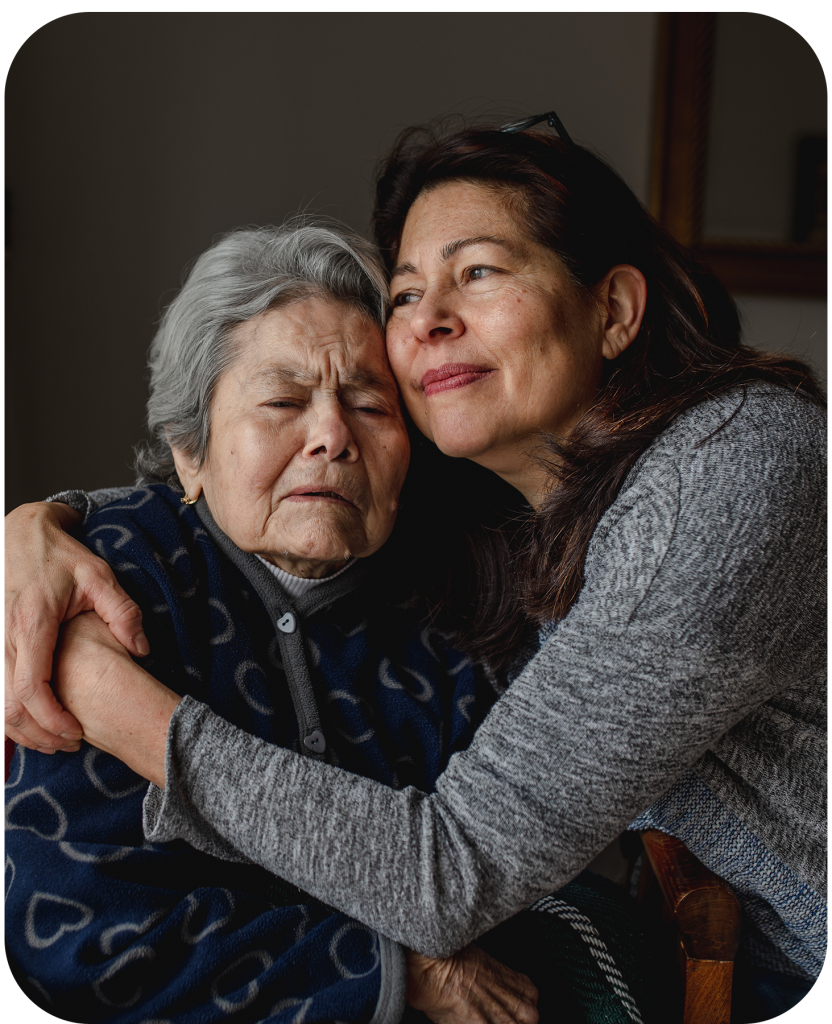Supporting Someone You Love After Their Parent’s Dementia Diagnosis
When someone receives a diagnosis of Alzheimer’s disease, other forms of dementia, or another memory or cognitive disorder, many other people are also impacted. Those who are most affected are the loved ones of the individual who is living with dementia. But those loved ones will most likely have their own circles of friends, partners, and family members, who may not be close to the person who has been diagnosed, but who are concerned about the well-being of people in their life.
If someone you know has had a parent or other family member recently diagnosed with a cognitive disorder, the good news is you are well-positioned to support them in many ways. Your friend, family member, or partner is likely undergoing a heavy emotional toll while also having new responsibilities to manage. By taking compassionate action, you won’t just be improving the situation for one person – you’ll be helping them better care for their loved one who has dementia.
At Town Square at the Jersey Shore, our innovative and reminiscence-focused adult day programs have a host of benefits for our members who have a cognitive condition as well as their primary care partners. Town Square’s members enjoy days filled with social connection, learning, laughter, and fun, leading to better overall mood, satisfaction, and health in ways that are apparent even at home. And, thanks to the caregiver respite and peace of mind we offer, their care partners find themselves more relaxed, having a better outlook, and with more time for their own needs. Contact us today to learn more about how Town Square can help someone who is important to you and their parent or other loved one with dementia, or read further to find out the best ways to support a spouse, partner, or friend who is caring for someone with a cognitive condition.

How to Support a Loved One Whose Parent Has Dementia
The first thing to be aware of in helping someone handle their loved one’s dementia diagnosis is that it’s not a situation that can be “fixed”. When someone turns to you with problems, it’s a natural, and noble, impulse to wish to simply “take care of” the situation, but all forms of dementia are progressive diseases for which no cure exists at this time. This means there is nothing you can do that is a complete solution. Instead, the best thing to do is offer your understanding, patience, and a listening ear.
You may also want to give advice, but take care not to sound like you are handing down directives – avoid phrases like “You need to” and “I think you should” when discussing the matter of the dementia diagnosis. It’s better to ask “What would give you more peace of mind?”, “What is the biggest concern you want to resolve?”, and similar questions, which helps break down the sometimes overwhelming process of care planning into more manageable steps.
Specific helpful actions you can take include the following:
Learn About Dementia and Its Effects
Denial and lack of knowledge both can easily lead to problems caused by inappropriate methods of dementia care. Dementia is a condition that affects the entire brain, and loss of memory is far from the only symptom. People living with dementia may experience issues with some or all of speech, understanding, movement, decision-making, personal care, eyesight, and other forms of sensory perception, and more symptoms can arise as the condition progresses.
An improper view of dementia could cause care partners to do things that, while well-intentioned, are unhelpful or harmful. For example, spontaneously asking questions to a person who has dementia will not help them remember things or keep their brain active. If the person cannot answer, it will only make their symptoms more apparent and cause distress.
Find Out What It’s Like to Have a Family Member with Dementia
While it’s not possible to fully understand what someone is going through if you’re not in a similar situation yourself, offering empathy to your loved one who is caring for someone with dementia always helps. Avoid saying “I know how you feel,” because it’s likely not true – a better way to offer your support is “I can’t imagine how hard this is to deal with, but let’s deal with it together, one step at a time.”
Many people who have had a loved one diagnosed with dementia report that the hardest part is appearing to lose that person one step at a time. This can lead to intense fear and grief even while one’s loved one is still living, and to the incorrect notion that there is a point where a person with dementia is completely “gone”. In actuality, significant moments can be shared even with those who no longer seem to be able to express themselves. You can help your partner, spouse, or friend maintain their connection to their loved one with dementia by encouraging them to talk about their feelings and affirming the challenges of these intense emotions.
Understand the Stages of Dementia
The signs and stages of Alzheimer’s disease and other forms of dementia are slightly different for every person who has these conditions, but at the same time fall into general patterns that inform what kind of care that person needs. Knowing the basics and what to look for as the condition progresses is critical, and Town Square at the Jersey Shore also regularly holds educational programming that aims to equip people with effective caregiving skills. It can be hard for a caregiver to attend their first support group meeting or educational presentation alone, not knowing anyone else who will be in attendance, so attending alongside or on behalf of the dementia caregiver in your life can be very helpful.
Communicate, Listen, and Be Supportive
Listening actively to the concerns of your friend, spouse, or partner is one of the most important ways you can help them care for their loved one who has dementia. Active listening means paying close attention to the verbal and non-verbal messages in the conversation and providing appropriate feedback by repeating it in your own words. This shows that you really are listening and understanding, which is an invaluable show of support, but you should make sure not to interrupt or to overemphasize your own opinions in the process.
Provide Emotional Support
When a person in your life gets word of their loved one’s dementia diagnosis, they’ll immediately need reassurance and your guarantee of support. When the time is right – once the most fraught emotions and shock have calmed – you can begin to give practical suggestions, such as encouraging your partner or friend to find additional resources. Town Square at the Jersey Shore is able to provide access to trusted resources in the greater Ocean County area thanks to our network of vetted professional partners.
Encourage Open Communication
The care partners of people with dementia can benefit from being reminded to listen respectfully. Individuals with a cognitive disorder may not see the ways in which their capacities are reduced, and therefore might not understand their care partner’s valid concerns. Particularly in the middle stages of dementia, a person with this condition might be convinced they are completely healthy and not in need of any help, which is an impossible perception to overcome directly. It can only be worked around by asking the person with dementia to “just try” some form of help. As the supporter of a primary dementia care partner, your best path is to emphasize that navigating dementia is a process, there are no “magic formulas” for success, trial and error are part of the situation, and the same approach might not work all the time. Your partner, spouse, or friend will benefit from having you as a sounding board to brainstorm different solutions with.
Acknowledge and Respect a Care Partner’s Responsibilities
Simply showing that you know someone is doing their best in a physically and emotionally draining responsibility can go a long way. You can tell your friend or partner they’re doing a great job coping and that they’re a good caregiver, or communicate the accolades you want to give them in other ways. Surprising the person you’re close to with flowers, a small gift they’d like, or dinner out when practical can take their mind off the difficulty of dementia caregiving. Since they’re putting their own time and effort into the care of their loved one and making sacrifices, you should let them know that you think it’s all worthwhile.
Offer Practical Help
Of course, helping out personally in the ways you are able is a support technique every caregiver would appreciate. You can take your friend or partner’s loved one with dementia to appointments, run errands for the person you’re close to, or even just provide a brief caregiver’s respite. This can be as simple as offering to play a game with the person who has dementia, watch a film on TV with them, or take a car ride (while playing music on the car stereo), whether just to enjoy a drive on a nice day or to have an outing as appropriate.
Organize Activities
You can help both the person in your life and the individual with dementia they’re caring for stay as socially active as possible by arranging activities together. Past favorite activities may need to be adapted – lessening ambient noise and other distractions will help individuals with dementia make the most of each activity. A well-intentioned care partner might keep the person they care for away from their prior social connections because of fears of overwhelming or embarrassing that person, but maintaining social relationships is one of the best cognitive health strategies. You can do a great thing for the person in your life and their loved one with dementia by helping them seek out dementia-friendly outings, socialization opportunities, and worship services for those who are religious.
Research Respite Care Services in Your Area
Ultimately, primary dementia care partners are best served by relying on memory care professionals in order to provide regular respite care. This helps avoid or mitigate the possibility of burnout while also incorporating skilled care to improve the quality of life of the individual who has dementia. Town Square at the Jersey Shore strives to offer southeastern New Jersey’s best-quality adult day enrichment programming, allowing care partners respite during the important daytime hours on weekdays and assuring that our members who have dementia are well-served with reminiscence, friendship, the chance to learn and get creative, and vintage fun.
Connect with Other Families Affected by Dementia
Town Square at the Jersey Shore’s professional-led dementia support groups offer compassionate, expert guidance in addition to a space to share experiences. We teach caregivers how to reduce their anxiety, guilt, and uncertainty, understand the disease processes of dementia, improve their healthy coping skills, take action to keep their loved one aging at home for longer, and much more. To learn more about the wide range of support we give people with dementia, their loved ones, and those around them, contact us today.


